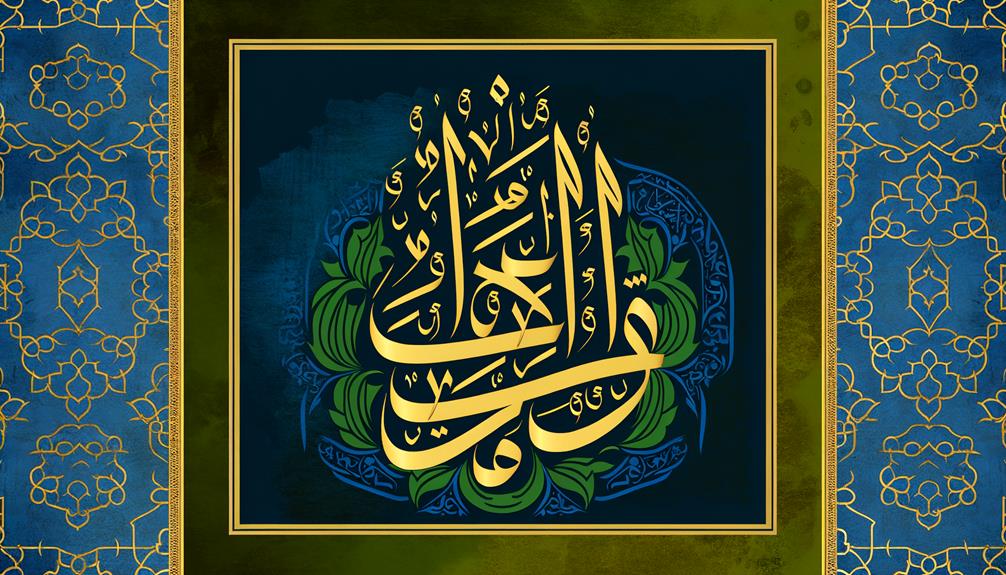Akbar Name Meaning in English
The name 'Akbar' has its origins in Arabic, meaning 'greater' or 'greatest'. It is derived from the phrase 'Allahu Akbar', which represents a superlative form in Arabic grammar.
Historically, it evokes the legacy of Akbar the Great, a Mughal Emperor known for significant administrative reforms and fostering religious tolerance. The name has also influenced South Asian artistic, architectural, and intellectual traditions.
In literature, Akbar is depicted as a figure embodying wisdom and justice. In contemporary times, the name continues to symbolize greatness and is prevalent in various fields, suggesting significance in both cultural and modern contexts.
For a deeper understanding, continue exploring its diverse applications and historical impact.

Key Takeaways
- 'Akbar' means 'greater' or 'greatest' in English, derived from Arabic.
- The name originates from the Arabic phrase 'Allahu Akbar.'
- It symbolizes greatness and reverence in Muslim communities.
- Historically, Akbar the Great was a renowned Mughal Emperor known for his administrative and cultural reforms.
- In modern usage, 'Akbar' is prominent in various fields, reflecting excellence and respect.
Etymology of Akbar
The term 'Akbar,' rooted in Arabic origins, translates to 'greater' or 'greatest,' and is most recognized from the phrase 'Allahu Akbar,' meaning 'God is greatest.'
This linguistic derivation is part of the Semitic language family, reflecting a superlative form in Arabic grammar. The root of the word, 'k-b-r,' encompasses the idea of greatness or magnitude, which is a common semantic thread in Semitic languages.
'Akbar' is utilized both in religious contexts and as a comparative adjective to denote superiority. Its use transcends religious exclamations, finding its place in names and titles, symbolizing eminence and reverence.
This etymological richness underscores its multifaceted significance within both linguistic and cultural frameworks.
Historical Significance
Throughout history, the name Akbar has been emblematic of power and grandeur, most prominently epitomized by the Mughal Emperor Akbar the Great, whose reign marked a significant era of cultural and political transformation in South Asia.
Ascending the throne in 1556, Akbar implemented administrative reforms that centralized governance and promoted religious tolerance, which were revolutionary for his time. His establishment of a merit-based bureaucracy and patronage of the arts and sciences facilitated an unprecedented flourishing of Indo-Persian culture.
Akbar's military conquests expanded the Mughal Empire's boundaries, securing its dominance in the region. His legacy endures as a paradigm of visionary leadership, making the name Akbar synonymous with enlightened rule and cultural synthesis.
Cultural Impact
Akbar's influence on cultural dynamics extended far beyond his reign, leaving an indelible mark on the artistic, architectural, and intellectual landscapes of South Asia.
As a patron of the arts, Akbar fostered a unique blend of Persian, Indian, and Central Asian artistic traditions. His architectural innovations, epitomized by the construction of the Fatehpur Sikri complex, showcased a synthesis of diverse regional styles and engineering prowess.
Intellectually, Akbar's court became a hub for scholars, poets, and philosophers, promoting a flourishing exchange of ideas. His establishment of the Din-i-Ilahi reflected his vision for religious tolerance and dialogue.
Consequently, Akbar's reign not only shaped the Mughal cultural renaissance but also laid the groundwork for subsequent cultural developments in the region.
Akbar in Literature
The name Akbar has been richly represented in literature, signifying both historical significance and multifaceted symbolism. Classical texts often depict Akbar as a figure of unparalleled wisdom and authority, embodying themes of justice and enlightenment.
In modern literature, the name continues to evoke these attributes, while also being reinterpreted to reflect contemporary societal values and challenges.
Historical Literary References
Exploring historical literary references, one finds that Akbar has been immortalized in numerous texts, which highlight his multifaceted contributions to culture, governance, and philosophy. His reign inspired a plethora of works, reflecting his profound impact on various facets of society. The following table encapsulates key literary references to Akbar:
| Text | Author |
|---|---|
| Akbarnama | Abul Fazl |
| Ain-i-Akbari | Abul Fazl |
| Tuzk-e-Jahangiri | Jahangir |
| Muntakhab-ut-Tawarikh | Al-Badaoni |
| Tarikh-i-Firishta | Muhammad Qasim Firishta |
These texts offer invaluable insights into Akbar's administration, his cultural policies, and his philosophical leanings, serving as primary sources for understanding his legacy. Each work provides a unique perspective on the emperor, reflecting the diverse ways in which he influenced the historical narrative.
Symbolism and Themes
While historical texts provide a detailed account of Akbar's reign, an examination of the symbolism and themes within these literary works reveals deeper insights into his ideological and cultural influence.
Akbar is frequently depicted as a paragon of wisdom, religious tolerance, and administrative acumen. Themes of unity and harmony pervade the literature, highlighting his efforts to integrate diverse cultural and religious communities.
Symbolically, Akbar is often associated with the sun, representing his role as a unifying force and enlightened ruler. Literary portrayals also emphasize his progressive policies and patronage of the arts, underscoring his vision of a cosmopolitan empire.
Such depictions not only enhance his historical image but also reflect broader socio-political aspirations of his era.
Akbar in Modern Texts
Contemporary literature continues to explore Akbar's legacy, portraying him not only as a historical figure but also as a symbol of multiculturalism and progressive governance. Authors like Salman Rushdie, in works such as 'The Enchantress of Florence,' delve into Akbar's reign, highlighting his efforts to foster religious tolerance and cultural synthesis.
This nuanced portrayal contrasts with traditional historiographies, emphasizing his innovative policies and patronage of the arts. Additionally, modern texts often examine his administrative reforms, which laid the foundation for a more inclusive and efficient empire.
These literary explorations serve to enhance our understanding of Akbar, presenting him as a visionary leader whose ideals resonate with contemporary discussions on diversity and governance.
Famous Personalities Named Akbar
The name Akbar has been historically significant, particularly epitomized by the Mughal Emperor Akbar, often referred to as Akbar the Great, whose reign marked a golden era in Indian history through cultural and administrative advancements.
Additionally, the name continues to resonate in contemporary times, with various modern Akbars making noteworthy contributions in media and other fields.
This section will analyze the impact and legacy of prominent individuals named Akbar, exploring their roles and contributions across different eras and sectors.
Mughal Emperor Akbar
Mughal Emperor Akbar, renowned for his administrative reforms and cultural patronage, stands as one of the most influential figures in Indian history.
Ascending the throne at a young age, Akbar implemented a series of groundbreaking policies that fortified the Mughal Empire's administration. His introduction of the Mansabdari system rationalized military and civil duties, enhancing governance efficiency.
Akbar's establishment of a centralized government structure, with provincial divisions and regulated taxation, exemplified his strategic acumen. Moreover, his patronage of the arts fostered a syncretic cultural milieu, blending Persian, Indian, and Islamic influences.
Akbar's emphasis on meritocracy and religious tolerance, manifested through initiatives like the Din-i-Ilahi, underscored his visionary leadership and enduring legacy in the annals of Indian history.
Akbar the Great
Beyond his administrative prowess and cultural patronage, Akbar's legacy extends to modern times, where his name has been adopted by numerous notable individuals, further solidifying his enduring influence. Among the myriad of Akbars, three stand out: Akbar Hashemi Rafsanjani, a pivotal figure in Iranian politics; Akbar Khan, a renowned Indian musician; and Akbar Ahmed, a distinguished scholar of Islamic studies. These individuals, through their contributions in diverse fields, echo the multifaceted nature of Emperor Akbar's own achievements, thus perpetuating his name across different spheres of human endeavor.
| Name | Field of Contribution | Notable Achievement |
|---|---|---|
| Akbar Hashemi Rafsanjani | Politics | Former President of Iran |
| Akbar Khan | Music | Renowned Indian classical musician |
| Akbar Ahmed | Academia | Leading scholar of Islamic studies |
Modern Akbars in Media
In contemporary media landscapes, several individuals named Akbar have achieved significant prominence, each contributing uniquely to their respective fields and thereby continuing the legacy of their illustrious namesake. These modern Akbars exemplify excellence and versatility across various domains.
- Akbar Gbaja-Biamila: A former NFL player turned television host, known for co-hosting the popular show 'American Ninja Warrior.'
- Akbar Al Baker: The CEO of Qatar Airways, recognized for his influential role in global aviation.
- Akbar Ahmed: A renowned anthropologist and author, celebrated for his work on Islamic studies and interfaith dialogue.
- Akbar V: A rising star in the music industry, gaining fame as a rapper and television personality on 'Love & Hip Hop: Atlanta.'
These figures collectively demonstrate the enduring impact of the name Akbar in modern media and society.
Modern Usage
Although rooted in historical significance, the name Akbar continues to hold cultural and social relevance in contemporary times, particularly within Muslim communities around the world.
In modern usage, the name Akbar remains prevalent as a given name, often symbolizing greatness and reverence, inspired by the legacy of Emperor Akbar, one of the most influential Mughal rulers.
The name is frequently used in various cultural and religious contexts, including naming ceremonies and prayers, reflecting its enduring legacy.
Contemporary figures bearing the name contribute to its sustained recognition, often seen in academia, politics, and social activism.
The name Akbar persists not only as a historical artifact but as a vibrant element of modern identity and heritage.
Symbolism and Meanings
The name Akbar, imbued with profound connotations, signifies greatness and majesty, drawing from its etymological roots in the Arabic language where it translates to 'greater' or 'greatest.' Its symbolic resonance extends beyond mere linguistic translation, encapsulating a multitude of dimensions: In Islamic tradition, the name Akbar is often associated with the historical figure Abu Bakr, the first caliph of Islam and a close companion of the Prophet Muhammad. The phrase ‘abu bakr meaning‘ encompasses the characteristics of leadership, wisdom, and piety, further enhancing the grandeur and significance of the name Akbar. Thus, when one bears the name Akbar, they not only carry the weight of greatness and majesty but also the noble traits embodied by Abu Bakr.
- Historical Significance: Akbar was prominently borne by the Mughal Emperor Akbar the Great, epitomizing wisdom and progressive governance.
- Religious Context: In Islamic tradition, 'Allahu Akbar' signifies the incomparable greatness of God.
- Cultural Impact: The name embodies a legacy of leadership and excellence in various cultures.
- Philosophical Undertones: It conveys an inherent aspiration towards excellence and higher virtues.
Thus, the name Akbar encompasses a rich tapestry of meanings that resonate deeply across different contexts.
Conclusion
The name Akbar, steeped in etymological richness and historical grandeur, embodies a legacy of immense cultural significance. Its omnipresence in literature and association with illustrious personalities further underscores its enduring impact.
While modern usage continues to evolve, the name remains a symbol of greatness and reverence.
In sum, the name Akbar transcends mere nomenclature, serving as a beacon of historical and cultural magnificence that echoes through the annals of time with unparalleled resonance.






